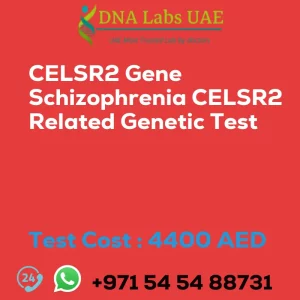POLG Gene Progressive External Ophthalmoplegia with Mitochondrial Deletions Type 1 Autosomal Dominant Genetic Test
Components:
- Test Name: POLG Gene Progressive External Ophthalmoplegia with Mitochondrial Deletions Type 1 Autosomal Dominant Genetic Test
- Price: 4400.0 AED
- Sample Condition: Blood or Extracted DNA or One drop Blood on FTA Card
- Report Delivery: 3 to 4 Weeks
- Method: NGS Technology
- Test Type: Neurological Disorders
- Doctor: Neurologist
- Test Department: Genetics
Pre Test Information:
Clinical History of Patient who is going for POLG Gene Progressive External Ophthalmoplegia with Mitochondrial Deletions Type 1, Autosomal Dominant NGS Genetic DNA Test. A Genetic Counselling session to draw a pedigree chart of family members affected with POLG Gene Progressive External Ophthalmoplegia with Mitochondrial Deletions Type 1, Autosomal Dominant.
Test Details:
Progressive External Ophthalmoplegia with Mitochondrial Deletions Type 1 (PEO1) is a genetic disorder characterized by weakness of the muscles that control eye movement (ophthalmoplegia) and other associated symptoms. It is caused by mutations in the POLG gene. The POLG gene provides instructions for making an enzyme called DNA polymerase gamma, which is involved in the replication and repair of mitochondrial DNA (mtDNA). Mutations in this gene can disrupt the normal functioning of DNA polymerase gamma, leading to mtDNA deletions and impairing mitochondrial function. Autosomal dominant inheritance means that an affected individual has one copy of the mutated gene and one normal copy, and the mutated gene is sufficient to cause the disorder.
NGS (Next-Generation Sequencing) Genetic Test refers to a type of genetic testing that utilizes advanced sequencing technologies to rapidly analyze multiple genes simultaneously. This allows for a more comprehensive analysis of the genetic information and can be used to identify mutations in the POLG gene associated with PEO1. NGS Genetic Test for PEO1 would involve obtaining a DNA sample, usually through a blood sample or saliva sample, from the individual suspected of having the condition. The DNA is then sequenced using NGS technology to identify any mutations in the POLG gene. The results of the test can help confirm the diagnosis of PEO1 and provide information about the specific mutation present, which can be useful for genetic counseling and family planning.
It is important to note that genetic testing should be done under the guidance of a healthcare professional or genetic counselor who can provide appropriate counseling and interpretation of the results.
| Test Name | POLG Gene Progressive external ophthalmoplegia with mitochondrial deletions type 1 autosomal dominant Genetic Test |
|---|---|
| Components | |
| Price | 4400.0 AED |
| Sample Condition | Blood or Extracted DNA or One drop Blood on FTA Card o |
| Report Delivery | 3 to 4 Weeks |
| Method | NGS Technology |
| Test type | Neurological Disorders |
| Doctor | Neurologist |
| Test Department: | Genetics |
| Pre Test Information | Clinical History of Patient who is going for POLG Gene Progressive external ophthalmoplegia with mitochondrial deletions type 1, autosomal dominant NGS Genetic DNA Test A Genetic Counselling session to draw a pedigree chart of family members affected with POLG Gene Progressive external ophthalmoplegia with mitochondrial deletions type 1, autosomal dominant |
| Test Details |
Progressive external ophthalmoplegia with mitochondrial deletions type 1 (PEO1) is a genetic disorder characterized by weakness of the muscles that control eye movement (ophthalmoplegia) and other associated symptoms. It is caused by mutations in the POLG gene. The POLG gene provides instructions for making an enzyme called DNA polymerase gamma, which is involved in the replication and repair of mitochondrial DNA (mtDNA). Mutations in this gene can disrupt the normal functioning of DNA polymerase gamma, leading to mtDNA deletions and impairing mitochondrial function. Autosomal dominant inheritance means that an affected individual has one copy of the mutated gene and one normal copy, and the mutated gene is sufficient to cause the disorder. NGS (Next-Generation Sequencing) Genetic Test refers to a type of genetic testing that utilizes advanced sequencing technologies to rapidly analyze multiple genes simultaneously. This allows for a more comprehensive analysis of the genetic information and can be used to identify mutations in the POLG gene associated with PEO1. NGS Genetic Test for PEO1 would involve obtaining a DNA sample, usually through a blood sample or saliva sample, from the individual suspected of having the condition. The DNA is then sequenced using NGS technology to identify any mutations in the POLG gene. The results of the test can help confirm the diagnosis of PEO1 and provide information about the specific mutation present, which can be useful for genetic counseling and family planning. It is important to note that genetic testing should be done under the guidance of a healthcare professional or genetic counselor who can provide appropriate counseling and interpretation of the results. |








